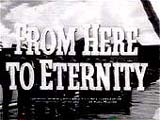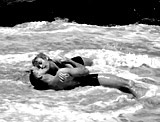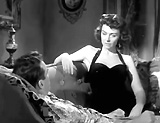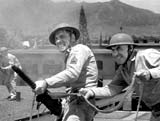
|
From Here
to Eternity (1953)
In Fred Zinnemann's provocative, Best Picture-winning
adaptation of James Jones' 1951 novel - a hefty, 859-page smoldering
tale; its sprawling and complex story-line about Army life with its
bold and explicit script (with strong language, violence and raw
sexual content) was at first considered unsuitable (and unfilmable)
for the screen; the ground-breaking film's subjects (ill-suited for
television) included prostitution, adultery, military injustice,
corruption and violence, alcohol abuse, and murder:
- the famous, erotic lovemaking scene - a horizontal
embrace and wave-covering kiss in the Hawaiian beach surf as it
broke over them during a secretive, torrid affair between career
soldier First Sgt. Milton Warden (Burt Lancaster) and the base
commander Captain Dana Holmes' (Philip Ober) neglected, promiscuous
wife Karen Holmes (Deborah Kerr) - their bodies were tightly locked
and intertwined in an embrace as they kissed each other and the
white foaming waves poured over them; afterwards, she rose, pranced
up the sand, and collapsed onto their blanket; Warden followed
and stood above her, dropped to his knees, and found her lips in
his, as she responded breathlessly - Karen: "I never knew
it could be like this. Nobody ever kissed me the way you do."
Warden: "Nobody?" Karen: "No, nobody."
|
The Infamous Hawaiian Beach Love-making Scene
|

|

|

|

|
- the scene of the death of Private Angelo Maggio
(Oscar-winning Frank Sinatra) in Robert E. Lee Prewitt's ("Prew")
(Montgomery Clift) arms, after a month of abuse and repeated vicious
beatings at the hands of sadistic, bullying, cruel stockade Sergeant "Fatso" Judson
(Ernest Borgnine); after Maggio's escape from the stockade and
just before dying, he warned Prewitt: "Fatso done it, Prew.
He likes to whack me in the gut. He asked me if it hurts and I
spit at him like always. Only yesterday it was bad. He hit me.
He hit me. He hit me. Then I-I had to get out, Prew. I had to get
out...They're gonna send me to the stockade, Prew? Watch out for
Fatso. Watch out for Fatso"
- the evening scene of lone Prewitt, in tribute to
his deceased friend, playing a soulful "taps" (dubbed by
Manny Klein) on the company's parade grounds; the camera found the
somber, saddened faces of Warden and other soldiers in the barracks
as they listened; tears streamed down Prewitt's cheeks
- the vengeful manslaughter (stabbing) murder of
"Fatso" by Prewitt - after Fatso showed no pity over his
dead friend Maggio's death: "Oh, the wop?...A real tough monkey"
- the announcement of the attack on Pearl Harbor on
December 7, 1941, when Sergeant Warden took charge and rallied his
enlisted men to prepare to fight - barking commands and orders to
the non-coms: "I want every man to get his rifle and go to his
bunk and stay there. And I mean stay there...You'll get your ears
shot off if you go outside. You wanna be heroes? You'll get plenty
of chances. There'll probably be Japs in your lap before night. Now
get movin'. We're wastin' time"
- the macho moment when Warden took a charismatic, leadership
role, held a heavy, repeating machine gun at his waist and fired
at the planes streaming overhead above the barracks during the Pearl
Harbor attack - one of his targets crashed in a ball of flames
- the scene of Prewitt's ill-advised attempt to return
to the barracks in the dark, when he left sympathetic hostess/hooker-girlfriend
Alma (Lorene) (Oscar-winning Donna Reed), and was accidentally and
tragically killed by sentinel guards who reacted nervously to him
(thinking that he was a Japanese ground-based saboteur) when he failed
to halt and identify himself
|
Prewitt's Death
|

|

|

|
|
Returning to Barracks in the Dark
|
Killed by Sentinel Guards
|
Warden's Epitaph
|
- Sgt. Warden's reaction to the "good soldier's"
demise with praise and a glorifying epitaph, and explained why he
didn't stop: "He was always a hardhead, sir. But he was
a good soldier. He loved the Army more than any soldier I ever
knew." Warden grieved over Prewitt's dead body with a eulogy
- he regretfully cursed Prew's perpetual stubbornness and overt
individuality that indirectly led to his death - when he couldn't "play
it smart": "You just couldn't play it smart, could
ya? All ya had to do was box. But no, not you, you hard-head!
Funny thing is, there ain't gonna be any boxin' championships
this year"
- the final scene of Karen and Alma leaning on the railing
of a Matson ocean liner leaving wartime Hawaii for the mainland to
find new lives - after lost and failed loves; on the deck as they
forlornly looked back toward the receding island, Karen threw two
flower leis into the water from the railing and then explained a
legend: "If they float in toward shore you'll come back someday.
If they float out to sea, you won't" - the flower leis floated
away - they wouldn't be coming back
- in the film's final lines, Alma spoke about Prewitt,
her fiancee - she memorialized him and their aborted affair - and
lied (or was deluded) about him when she described him as an idealized,
tragic (and romantic) hero who was killed while defending Pearl Harbor
- she mentioned his name: "He was named after a general - Robert
E. Lee - Prewitt...Robert E. Lee Prewitt. Isn't that a silly old
name?"
|

Death of Maggio
(Frank Sinatra)

"Prew's" Taps for Maggio

Fugitive "Prew" with Hooker-Girlfriend Alma (Lorene)
(Donna Reed)

Warden During Pearl Harbor Attack

Karen and Alma at Cruise-Ship Railing, Leaving Hawaii

Alma: "Robert E. Lee Prewitt. Isn't that a silly
old name?"

Legend of Two Flower Leis in Water
|








